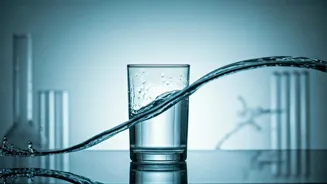The Hydration Equation
The core relationship between water and weight loss stems from various physiological mechanisms. Water plays a significant role in the body's metabolic
processes, including breaking down fat. Increased water intake can subtly boost your metabolism. A study published in the Journal of Clinical Endocrinology and Metabolism revealed that drinking 500 milliliters (about 17 ounces) of water increased metabolic rate by 30% in healthy men and women. Furthermore, water can help the body utilize stored fat for energy, a process known as lipolysis. Proper hydration also prevents dehydration, which can be mistaken for hunger signals, leading to overeating. Adequate water consumption can help you feel fuller, potentially reducing overall calorie intake. Water has no calories and is a healthy alternative to sugary drinks. Drinking water before meals can reduce the amount of calories you consume. Studies show that drinking water before a meal helps people consume fewer calories during the meal.
Boosting Metabolism Naturally
One of the key ways water supports weight loss is by enhancing metabolic function. As mentioned earlier, drinking cold water has been shown to temporarily increase the metabolic rate. This is because the body expends energy to warm the water to body temperature, thereby burning calories. While this effect is modest, it contributes to overall calorie expenditure throughout the day. Additionally, water helps the kidneys function optimally. The kidneys are essential for filtering waste products and toxins from the blood. When the body is dehydrated, the kidneys struggle to function correctly, and the liver takes on some of their workload. The liver is responsible for processing stored fat into energy. By ensuring your kidneys are well-hydrated, the liver can focus on its primary function, which is also beneficial for weight loss. Water also aids in the breakdown of fat, playing a crucial role in lipolysis.
Appetite Regulation Unveiled
Beyond its metabolic effects, water also helps regulate appetite, contributing to reduced calorie consumption. Often, the body can misinterpret thirst signals as hunger. Drinking water before meals helps you feel fuller, potentially leading to eating fewer calories. This simple strategy can be a game-changer for managing calorie intake. Water fills the stomach, triggering signals to the brain that suppress hunger. Studies have shown that individuals who drink water before meals consume fewer calories compared to those who do not. This effect can be particularly helpful during meal times. For individuals prone to overeating or snacking between meals, water can serve as a natural appetite suppressant. Therefore, by drinking water throughout the day, you can curb your cravings and make more conscious food choices.
Making Water a Habit
Incorporating more water into your daily routine is a relatively simple task. There are various practical tips to boost your water intake. Carry a reusable water bottle with you throughout the day, and refill it frequently. Set reminders on your phone or use apps to drink water at regular intervals. Add flavor to your water with fruits like lemon, cucumber, or berries to make it more appealing. Before each meal, consume a glass of water. This practice can aid in managing portion sizes and reducing calorie intake. Choose water over sugary drinks, which contribute empty calories and can hinder weight loss. Pay attention to your body's thirst cues. Drink water whenever you feel thirsty, even if you are not particularly hungry. Furthermore, incorporate water-rich foods like fruits and vegetables into your diet. Watermelon, cucumbers, and spinach are excellent choices to help you stay hydrated.
Debunking Common Myths
Several misconceptions surround water and its role in weight loss. Some people believe that drinking too much water can lead to water retention and bloating. In general, this is not the case. In most healthy individuals, the body regulates fluid balance effectively. Another misconception is that drinking water alone will magically lead to weight loss. Water is a tool, not a magic bullet. While it can aid weight loss by supporting metabolism and appetite, it must be combined with a balanced diet and regular exercise. Furthermore, there is a belief that all water is equal. The quality of the water matters. For example, tap water contains chlorine and fluoride. In the past, it was believed that drinking mineral water could help to lose weight. However, the results of scientific studies are not consistent enough to make this assumption.













